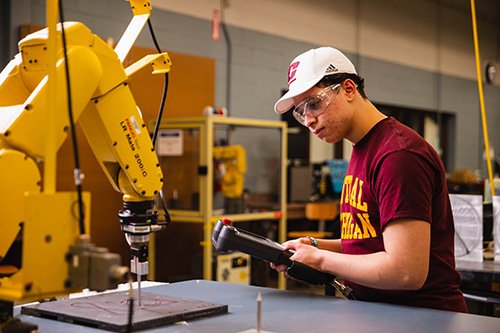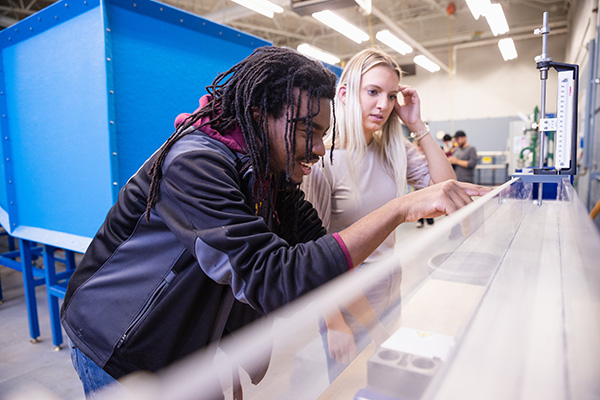School of Engineering and Technology Facilities
Experience cutting-edge labs and hands-on learning
At Central Michigan University’s School of Engineering and Technology, you’ll work in state-of-the-art laboratory spaces built to support your coursework and research. Benefit from faculty-led specialized labs and a shared teaching and research facility that gives you practical, hands-on experience in environmental analysis and engineering techniques.
Step into our labs and turn theory into real-world skills that set you apart.
Robotics and Automation Laboratory

The robotics and automation lab is equipped with five state-of-the-art FANUC industrial robots. Dr. Shaopeng (Frank) Cheng uses these robots to teach both theoretical and practical aspects of robotics in two courses: EGR 371 - Robotics and Automation and IET 375 - Robotics.
As a FANUC Certified Instructor through the FANUC Certified Education Robot Training (CERT) program since 2010, Dr. Cheng awards the FANUC Robot Education Certificate to students who successfully complete EGR 371 or IET 375.
Students proficient in operating and programming FANUC industrial robots gain a competitive edge in the job market by applying their skills to real-world automation solutions.
Innovation Central
Innovation Central is the hub of creativity and cutting-edge technology within the School of Engineering and Technology. This dynamic space is home to SET’s fleet of 3D printers, fully equipped ECE lab stations, and versatile workbenches, providing everything you need to bring your ideas to life.
One of the standout features? The 24’x30’ netted Drone Zone, where students and faculty actively design, build, and test groundbreaking drone projects. From delivery drones to inspection models and high-speed racing drones, Innovation Central is where concepts evolve into fully functional prototypes, all within a safe, controlled environment.
With more and more projects taking flight (literally!), this space continues to grow as a hub for engineering exploration. Whether you're refining a class project or collaborating on an RSO initiative, Innovation Central is here to turn your vision into reality.
Metals Lab
The Metals Lab (ET 126) is where you can roll up your sleeves and gain real-world experience in metalworking. From learning to use basic mills, drills, and presses to mastering welding techniques, this lab offers a variety of hands-on opportunities. You can work with equipment designed to alter metals and have access to CNC machines, where you’ll learn both operation and programming. The Metals Lab is an ideal space for anyone interested in the art and science of metal fabrication.
Shared Teaching and Research Laboratory
In the shared laboratory, you will develop proficiency in essential water quality measurement techniques used in water and wastewater treatment and environmental monitoring. This space also serves as a primary research environment for both undergraduate and graduate students.
Key equipment:
- Liquid Chromatographer
- Gas Chromatographer
- Spectrophotometer
- Membrane system
- Additional instrumentation for environmental analysis detecting specific contaminants
Faculty research laboratories
Anaerobic Biotechnology Laboratory
If you are interested in anaerobic digestion research, this laboratory is equipped with:
- A temperature-controlled environmental chamber
- Bioreactors
- An autoclave
- A furnace
- A digital reactor block
- A spectrophotometer
- A centrifuge
Environmental Genomics and Microbial Ecology Laboratory
In this lab, you will explore environmental genomics and microbial ecology, using molecular tools to analyze microbial interactions with significant implications for sustainability.
Key equipment:
- High and low-throughput quantitative polymerase chain reaction (qPCR) machines
- DNA and RNA analysis tools
- Various supplies for genetic sequencing and microbial studies
Research focus:
- Developing and applying novel molecular tools
- Conducting DNA and RNA analysis of environmental samples
- Understanding microorganisms and their roles in health and engineering
- Utilizing genomics to address environmental challenges
WaTTeR Lab
In this lab, you will work on water treatment and reuse technologies.
Research focus:
- Physicochemical water and wastewater treatment
- Advanced water treatment for reuse
Key equipment:
- Fluorescence spectrophotometer
- Total Organic Carbon Analyzer
- Solar simulator
Thermal Fluids Laboratory
 The Thermal Fluids Laboratory is primarily designed for undergraduate education, though faculty occasionally use its equipment for research.
The Thermal Fluids Laboratory is primarily designed for undergraduate education, though faculty occasionally use its equipment for research.
Why it’s important:
- Supports EGR-460, a required course for the BSME degree.
- Reinforces mechanical engineering principles covered in associated lecture courses.
Unique features:
- Gives you exposure to physical equipment and mensuration devices.
- Helps you develop skills in preparing experiment procedures and presenting engineering reports.
- While the experiments focus on fundamental mechanical engineering principles, they provide hands-on experience that strengthens theoretical knowledge.
